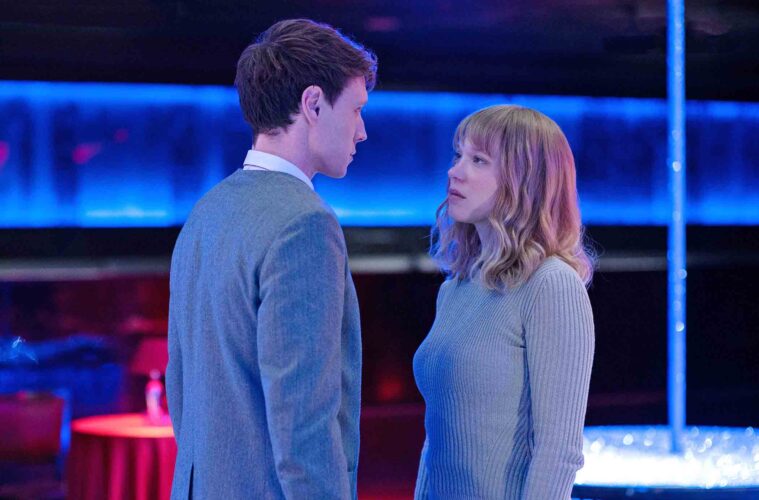
You will, having seen Bertrand Bonello’s new film, The Beast, walk away feeling as though you certainly saw something, but what? Ambitious, maddeningly vague, bristling with both invention and thematic confusion, veering a little too close to the frou-frou quasi-scientific spiritualism of Cloud Atlas and not nearly close enough to the emotional payload attached to any of its myriad topical ideas, the film tries so hard to be the Movie of the Moment that it seems to be already dated, like that deep-fake Obama meme from 2017.
This is a movie, after all, that ends not with a credit roll but a QR code for you to boink. (You might get quished!) Bonello hopscotches between three narrative timelines — I think it’s just three, if star Léa Seydoux’s various haircuts are any guide — all of which have some ostensible relationship to the screenplay’s source water, Henry James’s novella The Beast in the Jungle, one of the revered and thematically top-heavy stories in the Western canon. Famously, nothing much happens in the tale, which centers on a man so haunted by the sense of something horrible eventually occurring to him, stalking him like “a beast in the jungle,” that he postpones everything in life, until it becomes apparent that his neurotic withdrawal is the tragedy he’d dreaded. Since it’s James at the pen, the story is not as merely ironic as it sounds in synopsis; in 1903, it had a distinctly existential chill that seemed to anticipate acres of Modernism to come.
That was then. James’s mysterious-yet-modern crisis of pessimistic inaction doesn’t quite translate to the AI-controlled world that Bonello conjures in one of the film’s threads, a decades-hence realm in which Gabrielle (Seydoux) struggles to decide to do what everyone is doing — have AI “cleanse your DNA” of the trauma of “past lives,” and in the process give up her emotions, body-snatcher-style. Cleansing DNA of past lives? I’ve often thought that people who don’t know anything about science fiction shouldn’t try to write science fiction — particularly if they’re French — and, sorry, the soft bones of Bonello’s story (co-written with Guillaume Breaud and Benjamin Charbit) scan like teenage fan fiction. (But then, so did Cloud Atlas.) Gabrielle’s indecision requires a lot of brooding and chats with various soothing AI voices, in addition to a solicitous, lipsticked android (Saint Omer’s Guslagie Malanda), who even offers sex. At the AI-purification site Gabrielle meets Louis (George MacKay), and they bandy the options about. Will they acquiesce, and surrender their unspecified anxieties to the machine?
In the meantime, the film shuttles back and forth to what we can surmise is supposed to be a few of the pair’s toxic past lives. First we go to late 1800s Paris, in which Gabrielle is a married pianist and Louis is a flirtatious new-guy-in-town; here they essentially manifest James’s story, with all of its evasive chit chat and with the evocative addition of a doll factory run by Gabrielle’s husband. The third thread we visit is in the present, in which Gabrielle is a lonesome out-of-work actress in L.A. housesitting a vast nouveau villa in the hills and Louis is a raving incel, making videos of himself railing against women and claiming to be a 30-year-old virgin. Naturally, he begins stalking her.
Needless to say, James’s fatalism gets lost in the stew — which also includes psychics, urban riots, extreme designer drugs, surveillance angst, plastic surgery recommendations, mention of an American “civil war” in the future, an earthquake, a virtual retro-disco, and a combo fire-flood in that doll factory that plays like a scene from The Poseidon Adventure. (Can’t help but love the drowned rats suspended in the drink.) Bonello is a dynamic image-maker, but his films often feel like beautiful dumpsters into which he tosses too many ideas, hoping they’ll cross-pollinate and cohere. In this film, he seems to be vying to emulate Leos Carax’s junk-drawer haute cuisine, but without Carax’s flair or nerve. You watch Séydoux work her movie star magic like a dray horse in all three scenarios, but to little end, since her underwritten characters seem as baffled as we are about what’s going on. Swapping out thematic or metaphoric force in an effort to be au courant — which movies, a 20th-century art form, may be inherently ill-suited to do — The Beast seems at times conscientiously cryptic, often interrupting scenes with video glitches and replaying scenes with different outcomes. You could assume it’s all subjective, all happening in Gabrielle’s head during her “purification” rite, but the film’s editing doesn’t always lead you there. That conclusion would be, in any case, pretty shruggable.
“Pretentious” isn’t a word used too often anymore, in a cultural landscape where so few movies try to take any significant stab at expressing our contemporary churn, but Bonello’s movie certainly seems too big for its britches. That may not be a deal-breaker for you — sometimes a confounding folly (like Carax’s Annette?) can out-tantalize the eloquent and precision-cut. Individual results may vary.
Advertising disclosure: We may receive compensation for some of the links in our stories. Thank you for supporting LA Weekly and our advertisers.

